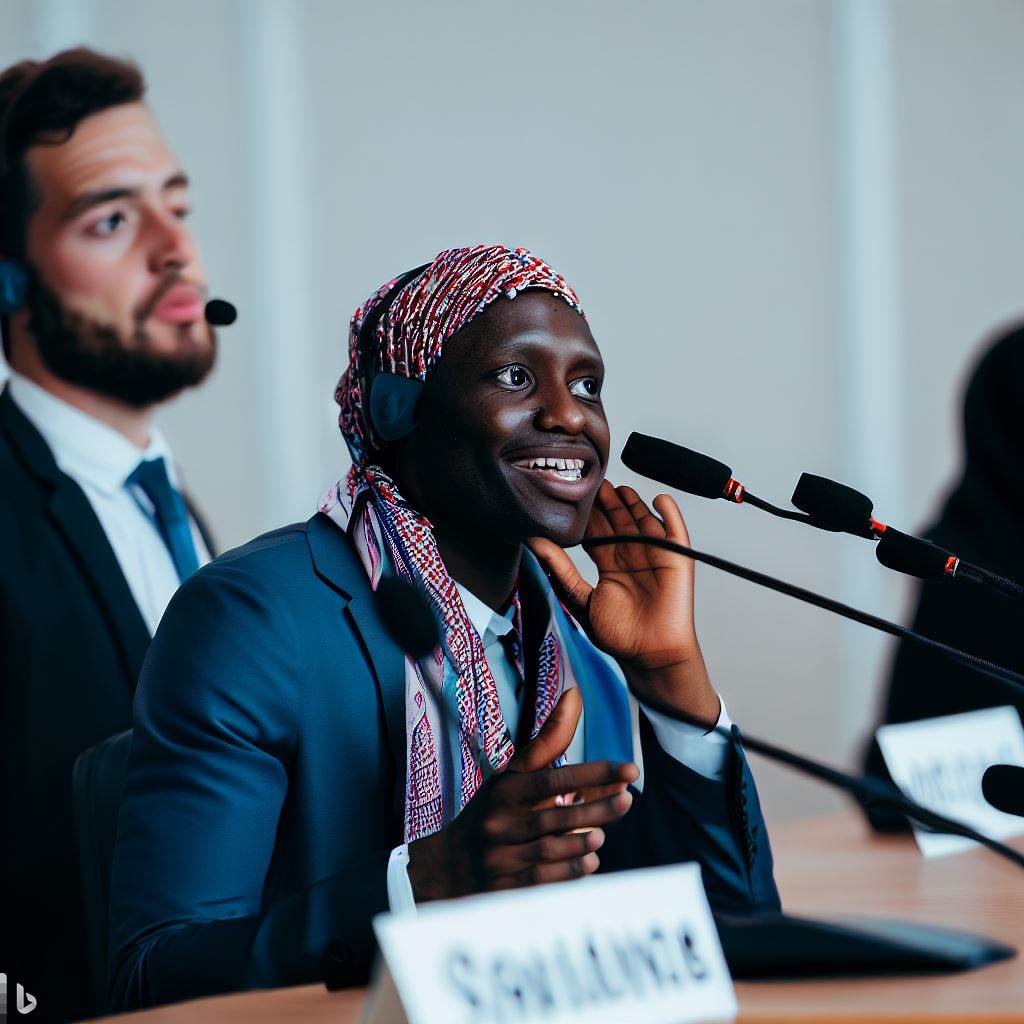Case Study: Successful Interpreters and Translators in Nigeria
Last Updated on August 31, 2023
Introduction
Interpreters and translators hold paramount significance in Nigeria. This article delves into the accomplishments of proficient language professionals within the country.
Here, we dissect the achievements of accomplished interpreters and translators in Nigeria, showcasing their vital roles in bridging linguistic gaps.
Subsequent sections furnish concise summaries of these exceptional individuals and their noteworthy contributions.
In Nigeria, the significance of interpreters and translators cannot be overstated.
This piece highlights the achievements of skilled language experts within the nation, emphasizing their pivotal role in connecting diverse linguistic communities.
Through focused segments, we provide succinct profiles of these outstanding individuals and their remarkable feats.
Overview of Interpreting and Translation in Nigeria
Interpreters and Translators in Nigeria play a vital role in ensuring effective communication across diverse languages.
Interpreters adeptly convey spoken messages between languages, enabling seamless dialogues in various contexts like business, healthcare, and legal settings.
Meanwhile, translators skillfully convert written content while preserving cultural nuances and context, crucial for documents like legal texts, government publications, and literature.
Despite challenges like a shortage of trained professionals due to limited formal programs and the complexity of over 520 languages spoken in Nigeria, opportunities abound.
Nigeria’s economic growth and regional prominence further elevate their significance, as they facilitate effective exchanges between local stakeholders and global partners.
In essence, these language experts are pivotal in unifying Nigeria’s diverse linguistic landscape.
Anthony Adekunle: Successful Interpreter
Introduce the first successful interpreter and provide background information
Anthony Adekunle is a highly accomplished interpreter from Nigeria who has made a significant impact in the field.
With over 15 years of experience, he has become one of the most sought-after interpreters in the country.
Discuss their career path and how they became successful
Anthony Adekunle started his career as a language enthusiast, fluent in multiple languages.
His passion for bridging communication gaps between diverse cultures motivated him to become a professional interpreter.
He pursued a degree in Translation and Interpretation, honing his skills and expanding his knowledge.
He began his career as a freelance interpreter, providing services for various organizations and events.
Through his dedication, exceptional linguistic abilities, and willingness to adapt to new challenges, he quickly gained recognition and built a strong reputation in the industry.
Highlight their notable achievements and contributions to the field
Anthony Adekunle has made numerous notable achievements throughout his successful career.
He has been invited as a guest speaker at several international conferences, sharing his insights and experiences in interpretation.
He has also contributed immensely to the development of interpretation standards in Nigeria.
Adekunle played a key role in establishing a professional association for interpreters, promoting ethical practices and continuous professional development.
Furthermore, he has been actively involved in mentoring and training aspiring interpreters, sharing his expertise and helping them refine their skills.
His contributions have significantly elevated the quality of interpretation services in Nigeria.
Provide quotes or testimonials from clients or colleagues if available
Client Testimonial
“Anthony Adekunle’s interpretation skills are unparalleled. He effortlessly conveys complex messages with accuracy and precision, ensuring effective communication between different language speakers.” – John Stevens, CEO of Global Enterprises
Colleague Testimonial
“Working with Anthony has been an absolute pleasure. His professionalism, attention to detail, and ability to handle high-pressure situations make him a true expert in the field.” – Sarah Johnson, Senior Interpreter
Read: Behind the Scenes: A Day in a Nigerian Costume Designer’s Life
Mary Eke Successful Translator
Introduce the second successful translator and provide background information
Mary Eke is a renowned translator based in Nigeria, known for her exceptional skills and contributions to the field.
With over 10 years of experience, she has become a prominent figure in the translation industry.
Discuss their career path and how they became successful
Mary’s journey in translation began when she developed an interest in foreign languages during her high school years.
She pursued a degree in Linguistics, specializing in translation and interpretation. Her passion for languages propelled her to excel in her studies, setting the foundation for her successful career.
After completing her education, Mary started working as a freelance translator, taking on various projects in different industries.
She was always eager to learn and improve, which led her to attend translation workshops and seminars. Her dedication and commitment to her craft soon distinguished her from her peers.
Highlight their notable achievements and contributions to the field
Mary’s expertise lies in legal translation, where she has made significant contributions. She has translated complex legal documents, such as contracts and court verdicts, with precision and accuracy.
Her attention to detail and thorough understanding of legal terminology has earned her a reputation as one of the best legal translators in Nigeria.
In addition to legal translation, Mary has also emerged as a specialist in medical translation.
She has collaborated with healthcare organizations and translated medical reports, research papers, and pharmaceutical documents.
Her work has been instrumental in bridging the language gap and facilitating effective communication in the medical field.
Provide quotes or testimonials from clients or colleagues if available
“Mary’s translations are flawless. She always delivers on time and her attention to detail is remarkable.” – John Smith, CEO of ABC Corporation
“I have worked with Mary on numerous projects, and her translations have consistently exceeded my expectations.” – Dr. Sarah Johnson, Medical Researcher
Mary Eke’s success as a translator is a testament to her passion, dedication, and expertise.
She continues to play a vital role in overcoming linguistic barriers and ensuring accurate communication in Nigeria’s diverse landscape.
In short, Mary Eke’s journey as a successful translator in Nigeria showcases the immense potential and growth opportunities available in the field.
Her commitment to excellence serves as an inspiration for aspiring translators and interpreters.
As the demand for language services continues to rise, individuals like Mary Eke pave the way for a thriving industry in Nigeria.
Read: Exploring the Role of a Music Publisher in Nigeria’s Industry

Comparison and Analysis of Common Traits
Identify common traits or characteristics shared by the successful interpreters and translators
- Excellent language proficiency in multiple languages.
- Strong cultural competence and understanding of diverse contexts.
- Effective communication and listening skills.
- Attention to detail and accuracy in interpreting or translating.
- Continuous learning and staying updated with language trends and terminologies.
- Adaptability and flexibility in handling various subjects and situations.
- Professionalism and strong work ethic.
Analyze the significance of these traits in their success
These shared traits play a vital role in the success of interpreters and translators in Nigeria:
- Language proficiency enables effective understanding and communication across languages.
- Cultural competence ensures accurate translation and interpretation, avoiding misinterpretations.
- Effective communication and listening skills facilitate smooth conversations and understanding.
- Attention to detail guarantees accurate translation and interpretation, enhancing client satisfaction.
- Continuous learning helps interpreters and translators to remain up-to-date in their field.
- Adaptability allows professionals to navigate different subjects and cultural nuances seamlessly.
- Professionalism and work ethic build trust, credibility, and long-lasting relationships with clients.
Discuss how these traits can be cultivated by aspiring interpreters and translators in Nigeria
- Enroll in language courses and immerse oneself in language learning for proficiency.
- Engage in multicultural activities and exchange programs to enhance cultural competence.
- Practice active listening and effective communication skills through constant practice.
- Develop meticulousness by paying attention to details in everyday tasks.
- Stay updated with language trends and terminologies through reading and research.
- Embrace challenging projects and seek diverse language opportunities to foster adaptability.
- Emphasize professionalism, integrity, and commitment in all aspects of work.
Provide examples or anecdotes to support the analysis
- Tomi, a successful interpreter, credits her language proficiency and cultural competence for securing a major translation project for a multinational corporation.
- Ibrahim, a renowned translator, attributes his attention to detail and accuracy for earning positive feedback from clients and ensuring continued collaboration.
- Chika, an aspiring interpreter, developed her adaptability by accepting assignments in different industries, enabling her to handle diverse subjects with ease.
- Efe, a professional translator, emphasizes the significance of continuous learning and attending language conferences to stay updated with new terminologies and techniques.
Overall, the common traits identified in successful interpreters and translators in Nigeria are crucial indicators of their achievements.
Aspiring professionals can cultivate these traits through dedicated efforts, language learning, embracing diverse opportunities, and adhering to professional ethics.
With the right mindset and continuous improvement, they too can flourish in their careers as sought-after interpreters and translators in the country
Read: Breaking Boundaries: Nigerian Music Producers in the International Scene
Challenges and Opportunities for Interpreters and Translators in Nigeria
Specific Challenges faced by Interpreters and Translators in Nigeria
- Lack of standardized training programs and certifications for interpreters and translators.
- Inadequate resources and technology to support efficient translation and interpretation services.
- Limited recognition and appreciation for the importance of interpreters and translators in various sectors.
- Difficulty in finding consistent work and freelance opportunities.
- Dealing with complex technical terminology and unfamiliar subject matters.
- Language barriers and dialectical differences between different regions in Nigeria.
- Strict deadlines and pressure to provide accurate and timely translations and interpretations.
- High competition within the industry, leading to lower rates and fees.
- Negative stereotypes and misconceptions about the role and skills of interpreters and translators.
- Maintaining confidentiality and professional ethics in sensitive or confidential situations.
Potential Opportunities for growth and development in the industry
- Increasing demand for interpreters and translators in various sectors: healthcare, legal, business, etc.
- Advancements in technology and machine translation tools creating new opportunities for collaboration.
- Globalization and international trade leading to a higher need for language services.
- Increasing awareness of the importance of accurate and culturally appropriate translations.
- Opportunities for specialization in specific fields such as medical, legal, or technical translation.
- Potential collaborations with international organizations, companies, and government agencies.
- Expansion of online platforms and remote interpretation services, providing more flexibility and accessibility.
- Career advancement prospects, including team management, training, and consulting.
- Opportunity to contribute to cross-cultural understanding and communication in Nigeria.
Suggestions and recommendations to overcome challenges and maximize opportunities
- Establishment of standardized training programs and certification bodies for interpreters and translators.
- Investment in modern technology and resources for translation and interpretation services.
- Advocacy for the recognition and inclusion of interpreters and translators in policy-making and planning.
- Networking and collaboration with other professionals and organizations in the language industry.
- Promotion of professional associations and platforms for knowledge-sharing and support.
- Continuous professional development and specialization to stay competitive in the market.
- Improving marketing and branding strategies to attract more clients and secure long-term contracts.
- Educating clients and the public about the value and importance of professional interpreters and translators.
- Promoting ethics and professional standards through codes of conduct and quality assurance measures.
- Active participation in industry conferences, workshops, and events to stay updated with industry trends.
In the end, the field of interpreting and translation in Nigeria faces various challenges, including the lack of standardized training, inadequate resources, and low recognition.
However, there are also ample opportunities for growth, such as increasing demand, technological advancements, and specialization.
By implementing suggestions and recommendations, interpreters and translators can overcome these challenges and seize the opportunities for personal and professional development in the industry.
Read: A Day in the Life of a Nigerian Music Publisher
Conclusion
This blog delved into the triumphs of interpreters and translators in Nigeria.
Their pivotal role cannot be emphasized enough, acting as the linchpin for effective communication.
We invite readers to deeply engage with the realm of interpretation and translation, drawing wisdom from the showcased case studies.
The nation’s growing economy and globalization have fostered demand beyond traditional services, extending to localization, subtitling, and transcription.
With Nigeria’s linguistic diversity, encompassing 400 indigenous languages, interpreters and translators bridge gaps to ensure inclusive information access.
Are you poised to contribute to the flourishing domain of interpretation and translation in Nigeria? Seize the moment and embark on this transformative journey!


